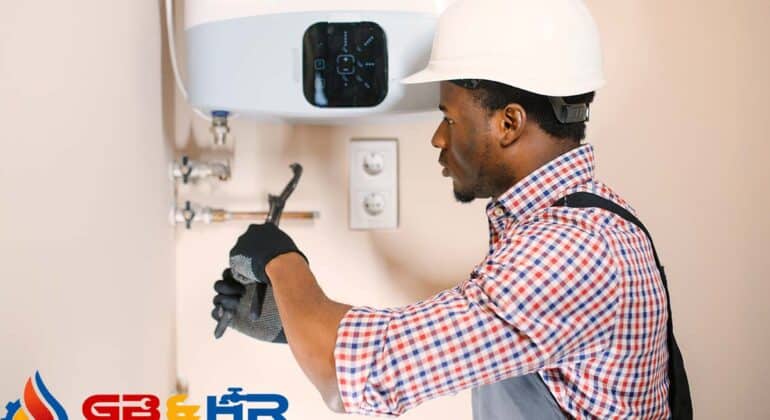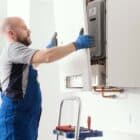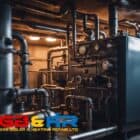If you are installing a new boiler in your home to ensure heating and hot water, it has to be a condensing boiler. A condensing boiler is not only a more efficient heating system compared to traditional boilers, but legislation also mandates the replacement of older boilers with these modern alternatives. In this comprehensive guide, we delve into the technology behind condensing boilers and explore the reasons why they outperform their conventional counterparts.
What are condensing boilers?
There is a basic principle at work for any boiler. The boiler burns fuel, which in turn produces water vapour/steam. This is what distributes heat throughout the central heating system. However, without condensing boilers, a large portion of this heat was lost, which means more fuel consumption.
How does a condensing boiler work?
In short, condensing boilers work by condensing water vapor in exhaust gases to recover latent heat, which would otherwise be wasted. This makes them highly efficient, achieving over 90% efficiency. Known as high-efficiency boilers, they optimize energy use and reduce fuel consumption.
The main feature of a condensing boiler is the addition of a secondary heat exchanger in addition to the primary one. By using gas or oil to produce heat, the central heating system also produces waste gases. Normally, the waste gas has to be expelled through the flue pipe.
Condensing boilers work with the so-called flue gases recovery system. What that does is recycle the heat generated from the steam, thus preventing it from being lost. The heat input remains the same, but there is better energy efficiency because the heat is put back into the radiators. This recycling of heat makes a condensing boiler less fuel reliant and superior to non-condensing units.
What is a non-condensing boiler?
Non condensing boilers use only a single heat exchanger chamber. This is where hot flue gases from the burner pass through to heat the water in the process. They are processed and directed to the exit flue.
Condensing boilers vs non-condensing boilers
It becomes immediately obvious that condensing boilers make full use of condensing mode, while non condensing boiler types do not have a second heat exchanger. The latter wastes a lot of exhaust gas and thus has lower energy efficiency.
New gas boilers, 100% of which are condensing, support lower energy bills because they are 90% more efficient. The efficiency rating of older domestic boilers ranges only between 70% and 80%. The clear winner is the new condensing boiler with its flue gas recovery system and more heat exchangers.
Аdvantages of condensing boilers
The advantages of a condensing boiler are many. Here are just a few of them:
- Lower heating bills – modern condensing boilers have a flue gas heat recovery system. This is a major advantage that makes the condensing process such an important feature. There is less wasted energy and more heat produced with these boilers. It makes the new boiler more energy efficient than a traditional boiler.
- Reduce carbon emissions – A-tier condensing boilers are well-regarded for their lower carbon emissions compared to non condensing boilers. Trading in an older boiler for a modern combi boiler can save as much as 1220 kg of CO2 emissions yearly.
- Safer technology – modern boilers do not take air from the property. They are a sealed system with the air coming in from the outside via a metal flue pipe. In case of a fault, the boiler is equipped with several levels of protection, such as a pressure relief valve that can turn it off.
Downsides of Condensing Boilers
When it comes to problems with condensing boilers, a large part of them are the same you would expect to encounter with non-condensing units.
- Blocked/frozen condensate pipe – perhaps a unique issue with this kind of boiler is trouble with the condensate pipe. Seeing as how non condensing boilers do not use one such pipe, newer boilers can run into trouble if the pipe freezes or becomes otherwise blocked.
- Leaks – if any amount of water is coming out of the system, this is a concern. A heating engineer will need to have a look to diagnose and repair the problem.
Does a condensing boiler need a drain?
The short answer is yes. Combi boilers, system boilers and any other boilers condensing the water vapour require a drain to dispose of waste condensation. It pairs up with the external flue to release the gas as steam.
Is a condensing boiler the same as a combi boiler?
A combi boiler is a type of condensing boiler that works double duty to provide both heating and hot water. That is why some heating engineers refer to it as a condensing combi boiler. However, it should be pointed out that not all condensing boilers are also combi boilers. Combi means they don’t need a separate tank and cylinder.
What temperature should a condensing boiler be set at?
For a good balance of warmth and efficiency, set your condensing boiler to at least 65°C. Setting it a few degrees higher is fine, but avoid setting it lower to prevent bacteria growth, such as Legionella.
Need a new boiler?
When it comes to replacing your boiler and any boiler installations matters, it is best to rely on professionals. At Gas Boiler and Heating Repair we offer years of expertise and knowledge on what boilers to choose and how to make the most of condensing gas boilers. Contact us today for a free quote.
How long do condensing boilers last?
For the average household, condensing boilers last about 10-15 years. This period may vary depending on how well you look after the boiler and whether you get it professionally checked on a frequent basis. We’ve written an extensive article explaining how long boilers last, for more information.
How to Choose Between a Combi, System and Regular Boiler?
A combi boiler is mainly known for the fact that it does not require a hot water cylinder. This makes it a good pick when space is premium. A system boiler is a better solution for a larger home. The installation process can be a bit more complicated, as a fan is needed to ensure exhaust gases are taken out. Read our guide on how to choose the best boiler type for your needs.
Are all new boilers condensing?
Every modern boiler has condensing technology incorporated. This means you won’t make compromises with heating and hot water for your home.
Is a Combi Boiler Suitable for My Home?
If the demand for hot running water in your home is not big, then a combi boiler can be a good pick for the household. Combi boilers can save you space, so that is another thing you need to consider.
What fuel do condensing boilers use?
Condensing boilers collect the gas that is generated from burning fuels – typically gas or oil – and then use it to heat the system. It is an efficient process that saves money and carbon emissions.
More space-efficient
Storage combi boilers are worthy of consideration when you have limited space. They deliver pressurised hot water for a small households without any problem and don’t take up much space.
No heating or hot water
A number of problems can cause trouble with heating and hot water. The motorised valves may have developed a fault, airlocks or diaphragms can be broken, or the thermostat can contribute to low pressure.
What size condensing boiler do I need?
There are a few factors impacting the size of the boiler you should get: the number of radiators in your home, the number of bathrooms that require hot water and the number of bedrooms that are being heated.
How much does a condensing boiler cost?
Depending on the brand and output of the boiler, you can expect to pay anywhere from £500 to £1,700.
Best small condensing combi boilers
The Viessmann Vitodens 100-W 26kW is a great small option for a small home. Baxi 600 – 24kW / 30kW is also worthy of consideration.
What is the efficiency rating of condensing boilers?
The efficiency rating of modern condensing boilers ranges from 92 to 94% ErP, meaning A-rated. In comparison, older boilers are only about 60% efficient, meaning G-rated.
FAQ
Where is the condensate pipe on my boiler?
The condensate pipe starts from the boiler and connects to the existing waste pipe system/external drain pipe. When connected to an external pipe, the condensate pipe can be found outside of your property connecting to the boiler.
Is boiler condensate harmful?
Condensate is the acidic carbon dioxide waste created during the burning of the fuel that boilers use. Since it is just mildly acidic, it is not as dangerous to the health.
How to defrost boiler condensate pipe?
Pouring hot water along the length of the pipe can have a nice thawing effect. The water should not be boiling hot, as this can damage the pipe.
How to stop your boiler condensate pipe from freezing?
Re-routing the pipe somewhere safer is the best method for preventing freezing. Insulation tends to work well too. Improving the size of the pipe and the way it is installed can also prevent freezing.
How do I know if my boiler is condensing?
Any boiler installed after 2005 is a condensing boiler, as it is required by law. If you are not sure when your boiler was installed, you can look up whether it is a condensing model in the manual. A flue pipe made of metal probably means it is not condensing, whereas a plastic pipe speaks the contrary.
Does a condensing boiler need a water tank?
Condensing boilers do not need a hot water tank, making them more convenient to fit in tight spaces.
Are condensing boilers good?
Non condensing boilers reach up to 78% efficiency, while condensing models go up to 99%. This makes them better at heating.
How to use a condensing boiler efficiently
Turning the flow temperature down is a good way to improve condensing boiler efficiency. This means it will use less gas to release energy.
What is the difference between a condensing and non condensing boiler?
The energy efficiency of a condensing boiler far surpasses that of non condensing boilers. The former has more than one heat exchanger, whereas the older non condensing boilers only use a single heat exchanger.
How do I know if I have a condensing boiler?
One telltale sign that you have a condensing boiler is the presence of a white plastic pipe coming out from the bottom of the boiler. Another way to tell is if the exhaust flue is plastic.
Do you need a water tank with a condensing boiler?
Condensing boilers don’t necessarily require a hot water tank or a cylinder to operate. Combi boilers for example operate without a water tank, while system boilers require one.
What is the most efficient way to run a condenser boiler?
Turning the flow temperature down is a good way to maximise efficiency. That way the boiler will use less gas to release a similar amount of heat.



